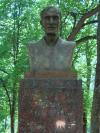George Bacovia poet from Romania was born on September 17, 1881, had 75 years and died on May 22, 1957. Poems were written mainly in Romanian language. Dominant movement is symbolism.
Biography
George Bacovia (Romanian pronunciation: ; the pen name of George Vasiliu; September 17 1881–May 22, 1957) was a Romanian symbolist poet. While he initially belonged to the local Symbolist movement, his poetry came to be seen as a precursor of Romanian Modernism and eventually established him in critical esteem alongside Tudor Arghezi, Lucian Blaga and Ion Barbu as one of the most important interwar Romanian poets.Bacovia was born George Andone Vasiliu in Bacău, the son of a merchant, Dimitrie Vasiliu, and his wife Zoe "Zoiţa" Vasiliu (born Langa). At only six years of age he began his study of German. Between 1889 and 1890 he started his schooling at an academy in Bacău, before registering in 1891 at the "Domnească" Primary School in the same city. In June 1893, he finished his primary schooling and afterward began studies at the Gimnaziul Ferdinand, also in Bacău. One autumn night, an oversight by the sexton led to his being locked overnight in the tower of the Precista church, an experience which would later inspire his first major poem, 1899's Amurg violet (Purple Twilight). He exhibited a talent for drawing and developed into an excellent violinist in the school orchestra, which he directed. He also distinguished himself in gymnastics.
In 1899, he received the national first prize in the contest "Tinerimii române" for "artistic drawings of nature." His poem Şi toate - written a year earlier under the name of "V. George" - was published in the magazine Literatorul on 30 March, launching his literary career.






